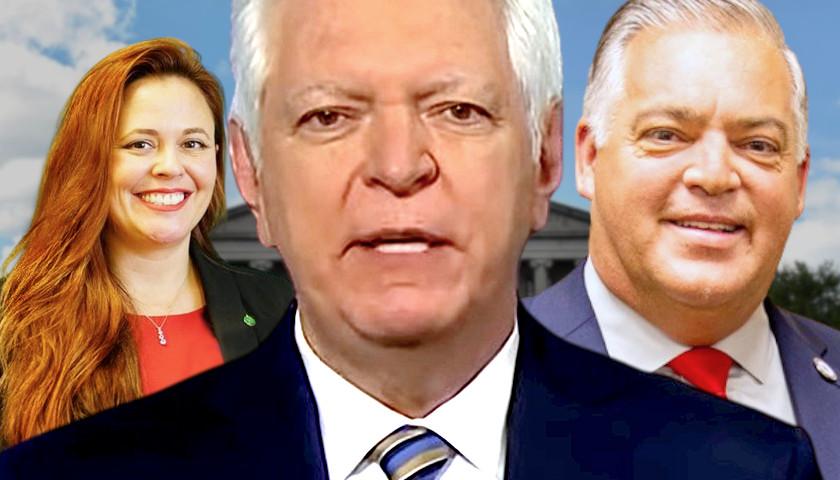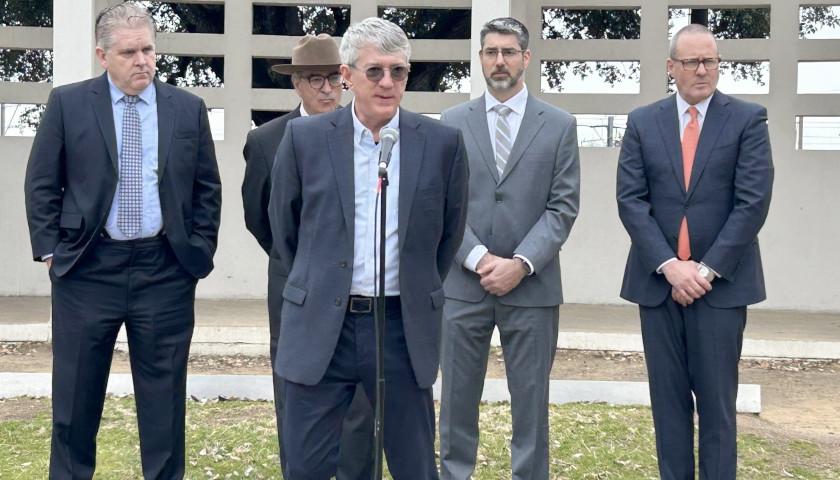Live from Music Row, Friday morning on The Tennessee Star Report with Michael Patrick Leahy – broadcast on Nashville’s Talk Radio 98.3 and 1510 WLAC weekdays from 5:00 a.m. to 8:00 a.m. – host Leahy welcomed Davidson County Republican Chair Lonnie Spivak in studio to explain a current bill that would alter 2023 elections statewide.
Leahy: Lonnie Spivak, our guest, the chairman of the Davidson County Republican Party. Here’s a note to all guests who come in studio. The best way to gain favor with the host is to bring him a waffle from Waffle House. (Spivak chuckles) I’ve been doing this for four years. Nobody has ever brought me a waffle from Waffle House as you have, Lonnie, and you have made my day.
Spivak: That’s great. It seems like we both had a hard time sleeping last night.
Leahy: We did.
Spivak: A little extra caffeine and little sugar never hurt anybody.
Leahy: (Chuckles) And even if I end up dead, who cares, right? Tell us, what might happen to elections in 2023 if this bill passes the Tennessee General Assembly?
Spivak: The consensus in the room yesterday was that the trimming down of the Metro Council from 40 to 20 is going to pass, and it’s going to pass without any amendments. And so that would require Metro Nashville to draw new districts and everything.
If they’re able to get that done by May 1st, then the new Metro elections with the smaller council will happen this year. But Metro says there’s just no way. It takes a minimum of six weeks to get anything through the Metro Council.
It just doesn’t seem like it’s going to be possible for Metro to get the Metro council districts redrawn and ready for an election this year. In that case, the way the law is written, the mayor and vice mayor elections would be this year, and the new Metro Council elections will be next year. The council that gets elected next year will serve a three-year term, and then they’ll be back on schedule.
So that being said, it looks like there’ll be a mayor and vice mayor election this year without council elections. And then there’s one other bill that they’re considering, which is whether or not to do away with runoff elections in the state of Tennessee.
Leahy: That’s a separate bill.
Spivak: It’s a separate bill.
Leahy: If that bill were to pass, would it apply to this August 3rd, 2023, mayoral election here in Nashville as it is written right now?
Spivak: The way I understand it, if there are not any amendments, it will take place this year.
Leahy: What would that mean for the mayoral election?
Spivak: What that would mean is if there were 14 Democrats in the race and one strong Republican. The likelihood of a strong Republican candidate winning the election with a majority of votes is much greater.
Leahy: Majority or plurality?
Spivak: Plurality.
Leahy: You mean a plurality.
Spivak: Plurality. Right.
Leahy: So let’s just run this through. That would mean if there’s no run-off this time around and the Republicans gathered around one candidate, and let’s say the Republican got 25 percent of the vote, and then let’s say the leading Democrat got 23 percent and the others got less than that. If that no runoff bill came about and you got elected by plurality, the Republican would win. Is that right?
Spivak: That’s correct. The way it works right now is if the Republican had 25 percent of the vote and the Democrat had 23 percent of the vote, there’d be a run-off, and most likely, the Democrat would win in the runoff because of the demographics of Nashville.
But if this law passes and it won’t just affect Nashville, it’s going to be a statewide thing, as I understand it, where there will be no run-off elections in the whole state. That gives the Republicans an opportunity to pick up seats and win elections in areas that they wouldn’t normally win if it was based on a majority of votes.
Leahy: That bill will be very controversial here in Nashville because it’s such a change. Since we’ve gone to this metro form of government, there’s never been a Republican or conservative elected mayor.
Spivak: And the one thing that’s interesting about Nashville is its non-partisan elections. And now we all know that the politics in Nashville is as partisan as it gets. But the elections themselves, you don’t run as a Republican or a Democrat. They’re non-partisan.
Leahy: What’s the likelihood that that bill will pass?
Spivak: (Sighs) The people I spoke to yesterday felt pretty confident that it will pass. You never really know what’s going to happen in the State House or what kind of amendments may be put on it. Both bills are currently sitting in committees. They haven’t progressed yet. But the sense that I got in the room was there was a likelihood that it would pass.
Leahy: Interesting. Well, that throws a real curveball into the mayoral election, doesn’t it?
Spivak: I think it would, for sure.
Leahy: It would enhance the likelihood, I think, that a conservative candidate or a moderate Republican candidate if the Republicans got behind that individual, it would have the likelihood that that person would become mayor.
Spivak: I agree. Now in my position that I’m in and the elected boards of the Republican Party in Nashville, obviously we can’t pick favorites among Republicans. We can support efforts as a whole, as a group. We can put maybe negative things out against opponents, but we cannot actively support a variety of Republicans. We cannot actively support one Republican in a race, if multiple declare.
Leahy: In a non-partisan election, how does that impact those rules about the Republican Party?
Spivak: I’ll have to look into that. I’m going to go on the understanding that I’m not going to be able to support candidates. But I’m still pretty new in the position. So I’ll have to reach out to Chairman Golden and the other parliamentarians in the State Party and get an actual opinion on that. I’m not sure.
Leahy: It’s kind of an odd situation, isn’t it? If you take a look at it, only one Republican has announced, Natisha Brooks. Fran Bush self-identified as an Independent, not as a Republican. It’s a lot of twists and turns there, isn’t it?
Spivak: There is. It’s going to be an interesting time, and I really look forward to what it’s going to hold for the candidates.
Listen to today’s show highlights, including this interview:
– – –
Tune in weekdays from 5:00 – 8:00 a.m. to The Tennessee Star Report with Michael Patrick Leahy on Talk Radio 98.3 FM WLAC 1510. Listen online at iHeart Radio.
Photo “Lonnie Spivak” by Lonnie Spivak. Background Photo “Davidson County Courthouse” by Luckiewiki. CC BY-SA 4.0.




